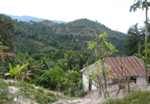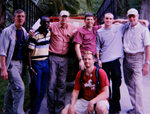|
|

|
Mission provides care, hope to Haitians
|
Editor’s
note: From Jan. 15 to Jan. 23, MUSC pediatric orthopaedist Frederick
“Rick” Reed, M.D., was part of a five-member team of physicians,
emergency medical technicians and a water engineer to provide support
to victims of the Jan. 12 earthquake in Haiti. The trip was supported
by The Refuge of Hilton Head and Hopital Lumiere through Dr. Robert
Belding of Columbia. The following are Reed's reflections.
One week in late January I was supposed to be spending an easy,
relaxing time of cross country skiing at Glacier National Park.
Instead, I spent nine exhausting days as part of a five-person team
providing urgent medical care in Haiti as we tried to save the arms and
legs of victims crushed by falling debris.
Our response came quickly after news about the 7.0 earthquake that
devastated areas of the west side of Hispaniola, especially around the
quake’s epicenter near Port-au-Prince, the island’s capital.
I had taken part in several medical mission trips working in Leogonne,
Jacmel and Port-au-Prince in the past. These three cities formed a
triangle framing the epicenter of the earthquake, and I learned from
colleagues that all three sites were destroyed. I contacted
orthopaedist Robert Belding, M.D., of Columbia, as soon as I heard a
seat opened up on a prior arranged flight out of Hilton Head. Water
Missions International facilitated this flight with a team carrying
their water project volunteer, Aaron Stephens. They originally needed
only one physician, but with two emergency medical technicians, Mike
Petrillo and Adam Kurtz, the ideal-sized group was achieved. Supplies
were received from Carolina Orthotics, Floyd Brace and area hospitals
in Columbia, Hilton Head and Charleston.
 This
is the rural landscape MUSC volunteers encountered on their travels. To
donate to the Department of Orthopaedics for future relief efforts,
contact 792-2677 or visit http://academicdepartments.musc.edu/development. Click
on make a gift, then College of Medicine. The designation site is in
the pull down box titled Orthopaedic Disaster Training Fund. This
is the rural landscape MUSC volunteers encountered on their travels. To
donate to the Department of Orthopaedics for future relief efforts,
contact 792-2677 or visit http://academicdepartments.musc.edu/development. Click
on make a gift, then College of Medicine. The designation site is in
the pull down box titled Orthopaedic Disaster Training Fund.
It was challenging to get to our destination, but we arrived safely at
the village of Bonne Fin, about a seven-hour drive south of
Port-au-Prince. Fortunately, this area of the island was structurally
unaffected by the earthquake, and was one of few hospitals available to
treat patients, especially earthquake victims who desperately sought
medical attention away from the demolished, crowded capital.
Upon our arrival, we were constantly challenged in caring for patients
suffering from days-old open fractures and wounds, crushed limbs and
severe dehydration. The smell of death and wails from suffering people
surrounded us daily. However, we remained focused and gave whatever
care was needed, providing brief exams, splinting limbs, and doing
casts and amputations and other triage for future surgery.
Pain medications, antibiotics and other needed drugs, bandages and
casting supplies were rapidly exhausted, but quickly replenished by
physicians at Cite Lumiere where the team had visited on the way to
Hopital Lumiere.
 Bringing
hope to Haitians are: Dr. Rick Reed, from left, Les Cayes, Robert
Belding, Mike Petrillo, Adam Kurtz, John Vrooman and Aaron Stephens. Bringing
hope to Haitians are: Dr. Rick Reed, from left, Les Cayes, Robert
Belding, Mike Petrillo, Adam Kurtz, John Vrooman and Aaron Stephens.
We felt that although the help we provided in a little more than a week
was valuable and lifesaving, our efforts were only the beginning of a
much needed, collaborative assistance. I believe there should be more
collaboration between worldwide relief organizations, such as the
United Nations and the Red Cross, and local medical personnel and
established missionary programs in the smaller communities in this
impoverished country. Grass roots efforts are needed to rebuild a
fragmented health care delivery system that is plagued by limited
education and corruption.
At times it was too late to save limbs, but not too late to give
Haitians the medical care needed. There still is much work to be
done, but the trip showed the success of how disaster relief
efforts can be administered successfully in small, rural areas like
Bonne Fin and Hopital Lumiere. These locations could network as
receiving hospitals for Haitians requiring acute medical care. Not
surprising to me and the team was the every day examples of
courage and human resilience shown by the Haitian people,
especially in the wake of death and disaster. Despite all the
tragedy, the Haitians are amazing people.
Friday, Feb. 12, 2010
|
|
|




